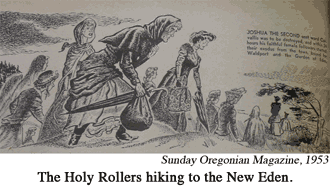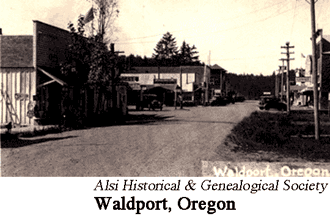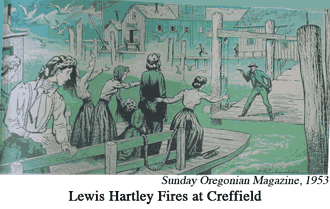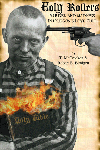Holbrook, Stewart. Sunday Oregonian Magazine. “Murder Without Tears, Part Three.” 22 February 1953. pp.
10-11.
Murder Without Tears
Third of Four Parts
By Stewart Holbrook
Portland Author
__
The self-anointed prophet,
Joshua the Second, gathered his followers, mostly female around him in his
Garden of Eden near Waldport. The women left their homes and families to follow
the fanatic, whose fondness for the fair sex finally brought him a violent
death.
___
In 1903 a fanatic named
Franz Creffield arrived at Corvallis to proclaim himself a true prophet, Joshua
the Second. He attracted a group of followers, nearly all female, to his new
cult, but with the passing of time his philandering activities caused the town
to be rocked by scandal and he was tarred and feathered and sent away.
After marrying one of his
followers, Maude Hunt, he induced her brother and sister-in-law to buy property
near Waldport, where Joshua set up a Garden of Eden, to where his followers
from Corvallis were called.
___
 Joshua the
Second was met at the railroad depot by Mr. and Mrs. Frank Hunt. They were all but speechless, but they somehow
managed to tell him in awed tones of telegraphic dispatches that day reporting
the total destruction of San Francisco by earthquake and fire.
Joshua the
Second was met at the railroad depot by Mr. and Mrs. Frank Hunt. They were all but speechless, but they somehow
managed to tell him in awed tones of telegraphic dispatches that day reporting
the total destruction of San Francisco by earthquake and fire.
If Oregon’s great prophet
was in any manner astonished, he did not show it. He merely smiled through his
beard.
"I knew it," he
said quietly, "that God would respond.
On the way across by ferry,
and so by buggy to the Garden of Eden, Joshua discussed with the Hunts his plans
for still more wonders. “The other cities of the plain must be destroyed, too.”
He said, meaning Seattle, Portland, Corvallis and Los Angeles.
“We must rouse the faithful
before it is too late."
And rouse they did. When a
man with a big long beard has friends who can shake a big city to pieces, it is
time to pay heed. The prophet sent the word through the mails to Corvallis and way points. I cannot find evidence that Joshua gave further
warning to Portland or the other two “cities of the plain.” Possibly he thought
they did not deserve it.
But warning hit Corvallis
with full force. Within 24 hours thereafter, trainmen on the Corvallis &
Eastern wondered at the sudden rise in passenger traffic. Nothing like it had
been seen since the boom days of Yaquina City, the shining mirage of the late
T. Egenton Hogg, and may the gods of the realtors
bless his soul.
All of this new traffic was
female. All of the females were heading for the end of the line at Newport.
There were middle-aged women
with babes in arms, middle-aged women with grown daughters, middle-aged women
alone, and a cluster of young girls in their teens who, it turned out, had run
away from home.
At least one of the
Corvallis & Eastern brakemen was struck with and remembered the slim beauty
of fair-haired Esther Mitchell, soon to be in headlines throughout the West.
There were two trains daily
out of Corvallis, and for the next several days every train brought a few stragglers
from the unquestionably doomed Sodom of Corvallis or its environs. All had to
be ferried across Yaquina Bay, thence on foot or in buggy to the Garden of
Joshua.
 The cynical folk around
Waldport put no stock in the prophet, not even after the terrifying results of
his great curse upon San Francisco became known.
The cynical folk around
Waldport put no stock in the prophet, not even after the terrifying results of
his great curse upon San Francisco became known.
Waldport was openly hostile.
But 90 miles east, back in troubled Corvallis, Joshua's trumpet call had
sounded clear and ominous.
Young girls started for
school and disappeared. Husbands returned home at evening found their wives
gone, at least one of them carrying a 6-week-old babe with her.
Still another husband found
a note pinned to a pillow in his home. It told him his wife had heard the call.
How strong was Joshua’s Call can be read between the lines of this note, a copy of
which survives. “I don’t want to leave in the daytime,” it read, “because the
children will see me and cry to go with me. I must leave when they’re asleep. I
have taken $2.50 of your money. This will not pay all my fare, and I will still
have to walk many miles to get to where I want to go.”
Walk she did, and alone,
down the west side of the Coast range where bear and
cougar stalked the way.
Down below Waldport, in Eden
the prophet was receiving more revelations. One special message told that
Corvallis was to be the next sinful city destroyed. Another directed that all
members of the cult to burn their conventional clothes and to wear a sort of
holy wrappers.
A generous fire was set
going and into it screaming, moaning women and girls heaved all their vile
finery, and forthwith dressed themselves in the wrappers that Joshua provided.
Considerable research has
failed to disclose where Joshua got these garments, but one who saw them told
me that at close range they looked like heavy cotton bathrobes.
There were to be no bathing
beauties in the times of Joshua II.
Meanwhile the prophet's
search for the second Mother of a Second Messiah forward . . . Praise Joshua
and great day in the morning.
Living conditions in the
Garden left much to be desired. Lean-to and wigwam huts were made. All hands
slept on the ground. Food was cooked over open fires and was plain. Between 40
and 50 girls and women and the two men were in the colony.
By the 26th of
April, or about one week after Joshua entered the Garden, at least one man in
Corvallis learned of the prophet’s whereabouts. This man's young daughter had
disappeared.
Investigation indicated she
had walked most of the way to Newport, then down the coast to the Garden. All
alone the youngster had done a good 80 miles on foot.
 Her
father, a solid citizen of Corvallis, set out to find her. He meant business.
Her
father, a solid citizen of Corvallis, set out to find her. He meant business.
At Newport he paused long
enough to purchase a .32-caliber revolver and a box of cartridges. Going down
to the waterfront to get transportation across Yaquina Bay, he just missed the
ferry.
On the ferryboat stood the
bearded prophet amid a group of wrappered females. The
Corvallis man recognized him at once and pulled his brand-new revolver. Aiming
it at Joshua, while the women screamed, he pulled the trigger—not once,
but five times in a row. The gun merely clicked.
Out on the ferryboat Joshua
smiled gently at the puny attempt of mere man to kill him. "See," said
he to his women. "You see how it is. No man can kill Joshua."
And the women now smiling
through their tears, had witnessed another example of
the prophet's powers.
But not the frustrated man
on the dock. "It was the god-damn fool who sold me them cartridges and
gun," he complained later to friends. "The gun is center-fire. The
cartridges are rim-fire. That's why that-----is still alive."
 But the men of seething
Corvallis, now thoroughly aroused, were getting ready to lay the prophet low.
Singly and in twos and threes they took train to Newport.
But the men of seething
Corvallis, now thoroughly aroused, were getting ready to lay the prophet low.
Singly and in twos and threes they took train to Newport.
Armed with rifles and
revolvers, they crossed on the ferry to Waldport. Here they learned that Joshua
must have been forewarned. He was last seen heading for Newport, alone. He had
doubtless hidden in the woods to let the several posses pass.
This information was
hurriedly telephoned to Corvallis. In that city was George Mitchell, 21-year-old
brother of Esther. Putting a revolver in his pocket, he went to
Albany--thinking he might catch the prophet there waiting for a train to
Portland.
At Albany Mitchell learned
he was too late. The prophet had been there and gone. With him was his wife, Maude.
The two had bought tickets to Seattle.
Young Mitchell had to remain
in Albany for another train. He arrived in Seattle on the morning of May 7,
1906.
Whether or not Mitchell knew
where in Seattle to look for the prophet is not known. What is clear as daylight is this.
About 8 o'clock on this particular
May morning, Joshua Creffield and his wife, now both garbed in conventional
fashion, though the prophet was still in full beard, left the rooming house
where they had taken lodgings and walked down Second avenue (sic) in Seattle, then turned into Cherry Street.
In front of Quick's drugstore
was a sidewalk weighing machine. The prophet's wife,
who in spite of the grim victuals at the Garden was more than plump, stepped
onto the scales, while the prophet stood looking into the store window.
Young George Mitchell was
just then walking down Cherry street (sic). He sighted
the couple. Without a word he stepped quickly up behind the man, placed the
muzzle of his revolver at the prophet's left ear, and fired.
Joshua the Second slumped
quietly down to the sidewalk. The historic spot, as yet unmarked, is on the
north side of Cherry street at the corner of First
avenue.
The prophet’s wife screamed
and flew at Mitchell trying to take the gun from his hand. Mitchell retained
the gun, but made no attempt to escape.
In another moment Maude left
him to bend over her husband, whose blood was running across the sidewalk and
making a little river in the gutter. The prophet had died without a shudder.
Mitchell stood idly by, the
gun still in his hand. Without a word he passed it to a policeman who had just
arrived.
Mrs. Creffield at first was
frantic, then she calmed. "This man," she told the cop, pointing to
the corpse, "this man is my husband, Joshua the prophet. In three days he
will arise and walk.
"Sure, sure," the
cop replied. He was used to all sorts of people. He humored them. “Sure
enough,” he added, “in a couple of days he’ll be up and around even if he ain’t
feeling too well.”
He called the pokey and the
morgue wagon.
At the police station George
Mitchell was calm, even happy. All he wanted was a telegraph blank. On it he
wrote a message to O. P. Hunt, Corvallis, Or., the
same who who was now late prophet’s father-in-law. (sic) The message read: I GOT MY MAN AND AM IN JAIL HERE.
Maud Creffield, the widow,
some how got word of Joshua‘s death to Mr. and Mrs. Frank Hunt at the Garden.
They hurried to Seattle, and it was over their protests and those of the
prophet that the prophet was buried at all. They insisted he was only
“temporarily dead.”
But the unfeeling cops
turned the body over to the Bonney-Watson undertakers, and those kindly men
stuffed cotton into the big hole back of the prophet's left ear, and laid him
away tenderly in Lakeview cemetery.
It was the 9th of
May. Only the widow and the undertakers were at the graveside. No services were
held.
That was how they laid the
Oregon prophet away in the ground. He was dead enough, but his work was far
from done. Another tragedy was building up.
Concluded next Sunday
Chapter of Holy Rollers where these articles are some of the sources:
The Prologue
Stewart Holbrook's Murder Without Tears, Part One
Stewart Holbrook's Murder Without Tears, Part Two
Stewart Holbrook's Murder Without Tears, Part Three
Stewart Holbrook's Murder Without Tears, Part Four
51Startling Detective Magazine, Nemesis of the Nudist High Priest
***
Newspaper Articles about Creffield & the Holy Rollers
1897-1903: B.C. (Before Creffield)
October to December 1903:Holy Rollers Burn Furniture & Pets
January to March, 1904: Holy Rollers Tarred and Feathered
April to June 1904: Holy Rollers are Committed to the Asylum
July 1904: Creffield is Found & Arrested
September 1904: Creffield's Trial
April 1906: Men are Gunning For Creffield
May 1906: Creffield is Murdered, Murderer is Considered a Hero
May 1906: Holy Rollers Found Starving Near Heceta Head
June 1906: George Mitchell's Trial Begins
July 1906: Hurt Testifies of Debauched Wife and Debased Sisters
July 1906: Esther Mitchell Kills Her Brother
August to October 1906: Seattle Prepares for another Big Trial
November 1906: Maud Hurt Creffield Commits Suicide
April 1909-August 1914: Esther Leaves the Asylum
1953 Stewart Holbrook's Murder Without Tears
1951Startling Detective Magazine, Nemesis of the Nudist High Priest
***
Chapters from
Holy Rollers: Murder & Madness in Oregon's Love Cult
Part 1: The Seduction
Chapter 1: Trust Me, Brothers And Sisters
(Life Before Creffield [B.C.])
Chapter 2: God, Save Us From Compromising Preachers
(Creffield's Preachings)
Chapter 3: The Flock
(Profiles of the Holy Rollers Were)
Chapter 4: The Holy Rollers
(Things Start to Get Wild on on Kiger Island)
Chapter 5: Housecleaning
(There's a Sacrificial Bonfire)
Chapter 6: Community Concerns
(Officers Visit)
Chapter 7: Esther, The Chosen One
(Creffield Plans to Marry 16-Year- Old)
Chapter 8: Tar and Feathers
(The Men of Corvallis Act)
Chapter 9: Sane People Don’t Go Bareheaded
(Holy Rollers are Committed to the Asylum)
Chapter 10: More Beast Than Man
( Creffield is Arrested)
Chapter 11: God Will Plead Creffield's Case
(Creffield in Court)
Chapter 12: Scandal
(Shocking Testimony at the Trial)
Chapter 13: Calm Before the Storm
(The Holy Rollers Resume their Lives)
Chapter 14: Giving Up The Ghost
(Men are Gunning for Creffield)
Part Two: The People V. Creffield
Chapter 16: The Widow Creffield
Chapter 19: An Inherited Streak of Insanity
Part Three: The Madness
Chapter 23: Seeking Reconciliation
Chapter 24: Another Holy Roller Page One Murder
Chapter 25: What Can Papa Do For You?
Chapter 26: Human Life is Too Cheap In This Community
Chapter 30: The Final Chapter
(What Happened to Everyone Afterwards)
The Epilogue
(Heaven's Gate)
